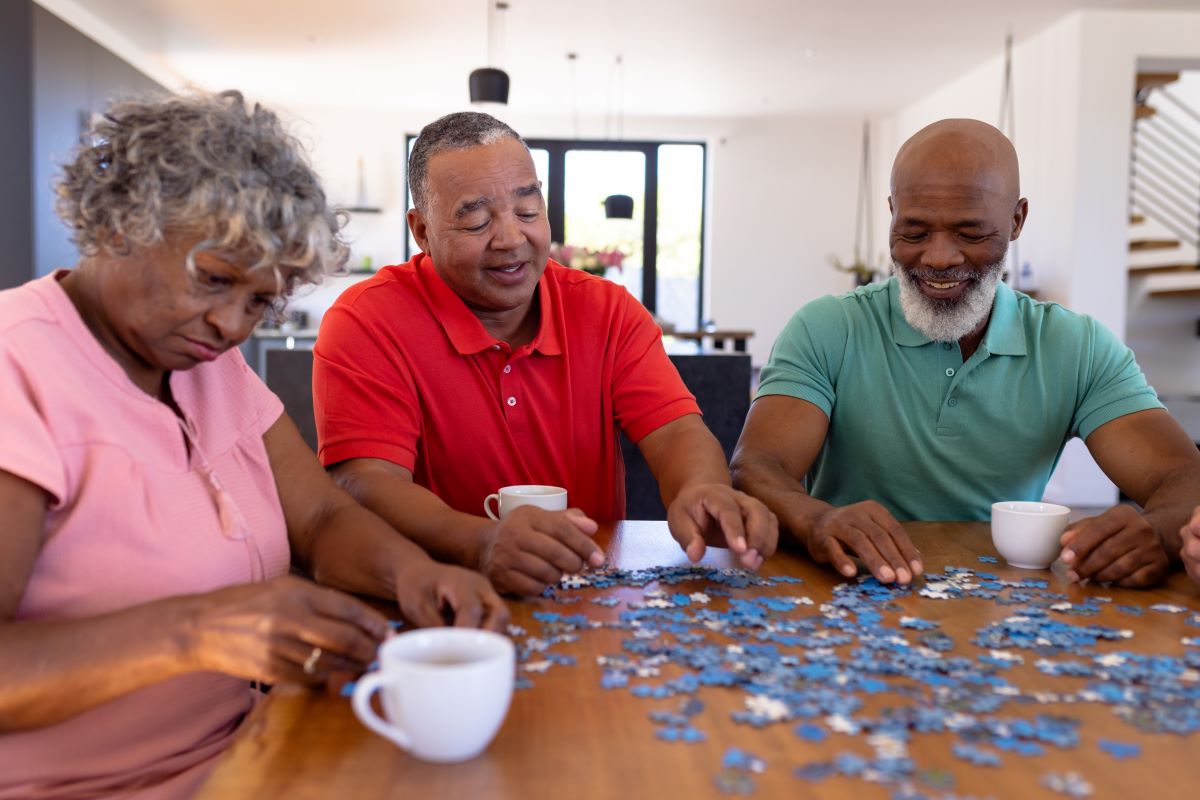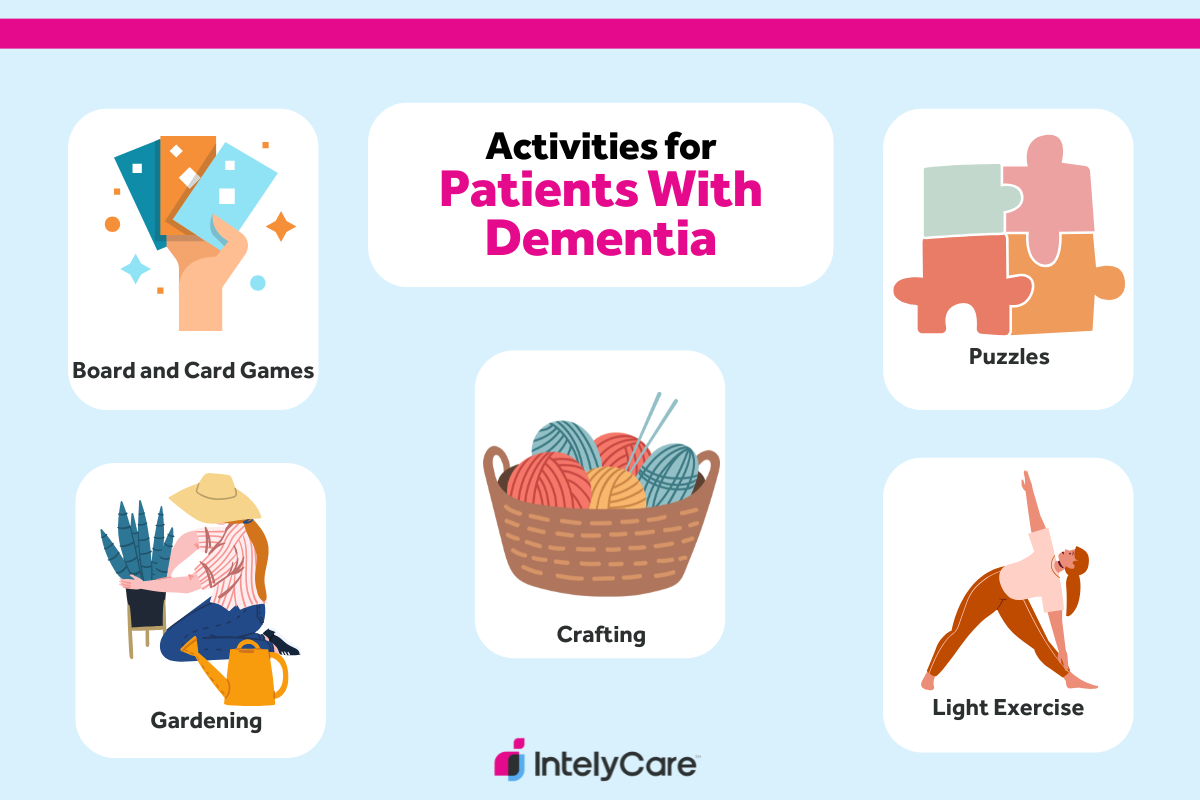Activities for Dementia Patients: Ideas for Facilities

Navigating dementia can be a challenging experience. As a facility leader, you may be looking for ways to ease these challenges for caregivers and their loved ones. While there is no known cure for dementia, stimulating activities can improve a patient’s quality of life and help them enjoy their time with loved ones. Emerging research has suggested that certain activities for dementia patients may even help slow down cognitive decline.
If you’re looking to incorporate fun activities into your dementia care protocols, this article can help you get started. We’ll describe the cognitive benefits of certain activities and provide meaningful tips for administrators looking to improve the health and quality of life of their dementia patients.
How Does Dementia Affect Cognitive Abilities?
Dementia describes a group of symptoms that cause a decline in cognitive abilities. There are various conditions that can cause dementia — the most common being Alzheimer’s disease — and each patient experiences symptoms differently. Fundamentally, though, dementia impacts an individual’s ability to think, remember, and reason with information, which can greatly interfere with their daily activities. More specific symptoms of dementia include:
- Memory loss and forgetfulness.
- Difficulty concentrating on tasks.
- Difficulty problem solving.
- Confusion and delirium.
- Emotional dysregulation.
- Withdrawal, apathy, or depression.
How Do Social Activities Benefit Dementia Patients?
There are many research studies highlighting the potential ways that activities such as crafts and games can benefit dementia patients. For instance, board games provide a safe outlet for social interaction and engagement. Alternatively, social activities like gardening and knitting allow dementia patients to spend more quality time with others, which may even help alleviate symptoms of depression.
Some studies have even shown that patients with mild dementia may reap improvements in their cognitive and physical functioning. Evidence on this is still quite limited and has only been associated with certain activities, games, and exercises. Regardless, many healthcare providers consider interactive activities as promising interventions to support the quality of life of their dementia patients.

5 Best Types of Activities for Dementia Patients
Activities come in all types of formats, and each one can offer different benefits. Below are five popular types of activities that can help support a range of cognitive abilities in dementia patients.
1. Board and Card Games
Board games have shown to help slow down cognitive decline in older patients, making them a great option for patients experiencing dementia symptoms. Having events to facilitate board games for dementia patients is also an effective way to enhance their social life, since these games often have an interactive, group component.
Card games introduce another fun way to exercise deductive reasoning and concentration skills. Many easy card games are played in a group setting, which enables your patients to spend time with their loved ones or other patients at your facility.
There are many different types of simple games for dementia patients available on the market. When deciding which game to choose, try to pick one that appeals to a patient’s existing interests. For example, if an individual likes to read mystery novels, try introducing them to a board game like Clue. Alternatively, if they worked in finance, they may get excited to play a game like Monopoly.
Board and card games to try:
- Solitaire
- Bingo
- Snakes and Ladders
- Go Fish
- Trouble
2. Gardening
If you’re trying to identify calming activities for dementia patients, gardening should be at the top of your list. Caring for plant life has been shown to increase energy levels, improve memory, alleviate loneliness, and reduce the incidence of depression, especially for those with limited social connection. It also encourages patients to move and socialize outdoors, even if they’re unable to participate in more strenuous activities like walking or lifting weights.
Gardening activities to try:
- Harvesting fruits and vegetables
- Building planter boxes
- Weeding garden beds
- Planting seeds and bulbs
- Watering flowers
3. Crafting
Crafting is one of the most popular activities for dementia patients in nursing homes and long-term care settings. It encourages creativity and play while improving dexterity, pattern recognition, and problem solving. Crafting can be done individually or in a group setting and can be adapted to meet the abilities of the patients you care for.
Crafting activities to try:
- Painting
- Knitting or crocheting
- Coloring or drawing
- Paper mache
- Pottery
4. Puzzles
Puzzles are great for dementia patients because they promote the use of cognitive skills in more relaxed settings. Puzzles come in a variety of formats and levels of difficulty, giving you options to tailor them to the abilities of your patients. Word puzzles can be great for verbal learning, while jigsaw puzzles can help with memory recall and reasoning.
Puzzles to try:
- Crosswords
- Jigsaws
- Word searches
- Anagrams
- Mad Libs
5. Light Exercise
Light exercise is one of the most important daily activities for dementia patients, as it helps to minimize mood imbalance, improve coordination, increase blood flow, and enhance sleep quality. When designing your dementia care protocols, be sure to offer exercise programs that align with the abilities of your unique patient population.;
For example, if many of your patients use wheelchairs, you can adapt your dance class to suit those who are sitting down. If you work at a rehab facility where individuals often have weight bearing restrictions, aquatic exercises are a great way to keep their blood pumping without causing an injury.
Light exercises to try:
- Dancing
- Yoga
- Zumba
- Tai Chi
- Water aerobics
Tips for Incorporating Activities Into Your Dementia Care Protocols
Now that you have a list of activities for dementia patients to choose from, you may have other logistical questions about how to introduce or incorporate these activities into your dementia care plans. The following three tips can help you get the ball rolling.
Select Appropriate Activities
When figuring out what type of activities your patient would like, it’s important to consider their individual abilities and the severity of their dementia. In general, research has suggested that patients with:
- Mild dementia can do well with complex activities and activities that require concentration.
- Moderate dementia can do well with activities centered around music and entertainment.
- Severe dementia can do best with simple physical activities and sensory/sorting activities.
Consider the Timing
Many individuals with dementia experience better or worse symptoms depending on the time of day. Take this into consideration and offer designated activity times when your patients are most alert and oriented. Many dementia patients experience worsening symptoms in the late afternoons and evenings. However, these fluctuations can still vary from person to person, so it’s important to stay attuned to each of your patient’s individual needs.
Keep Sessions Brief
Along with figuring out appropriate timing, activity sessions should be kept brief so that your patients don’t get overwhelmed. This allows your patients to take proper breaks so they’re recharged and ready to enjoy their next session. Below are general, recommended guidelines on how long activity periods for dementia patients should last:
- Mild dementia — 30 minutes
- Moderate dementia — 25 minutes
- Severe Dementia — 15 minutes
Help Your Patients Maintain a Higher Quality of Life
Providing meaningful activities for dementia patients is one of many ways to promote better health outcomes. Seeking other creative ways to support your patients? Our team of clinical experts has crafted dozens of helpful healthcare tips and guides, to be accessed whenever and whenever you need them most.






